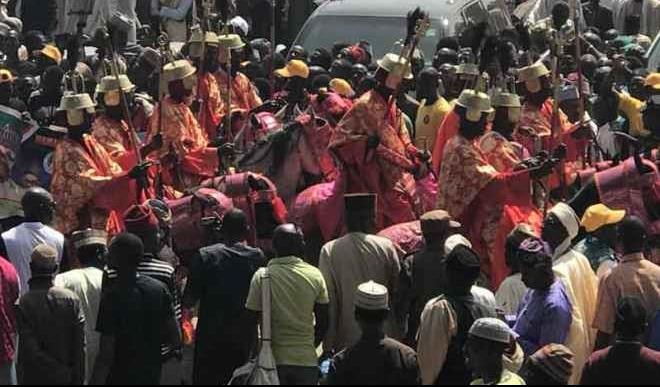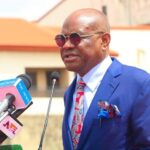
The crunching sound of hundreds of horse and camel hooves galloping and trampling in Kaduna at the weekend at a durbar to mark the city’s centenary reminded me to get a birthday card for a city that I consider to be my second home. Kaduna is today dominated by young folks who know the Web more than horses. The last great durbar took place in Kaduna in 1977 as part of that year’s FESTAC. There were many durbars in the 1950s through to the 1970s to celebrate various landmark events but probably the greatest durbar ever held in Kaduna was in 1956 when a very young Queen Elizabeth II, then three years old on the British throne, visited Nigeria.
The venue of last Saturday’s durbar, Murtala Square, known in the olden days as Race Course, is now a shadow of its old self. Much of this once huge expanse of open space has been steadily taken over by night clubs, shops, banks, gym, sports commission, a sports complex that was built when Kaduna hosted the national sports festival years ago, and the huge Umaru Yar’adua Auditorium. I am surprised that there was still enough space for a durbar.
Is Kaduna 100 years old or is it older than that? There is some controversy about its age. 1917 was the year that the British colonial regime made Kaduna the capital of Northern Nigeria, having moved it from Zungeru in present day Niger State, to which it had earlier moved from Lokoja. However, as Dr. Yusuf Nadabo recounted in his very interesting book Tarihin Garin Kaduna [which I first read in 1988], before Lugard moved in there was a cluster of villages all around the present Kaduna city including Kinkinau, Kawo, Mando and several Gbayi villages at Kakuri and Makera. There was also the huge settlement called Unguwar Leburori [i.e. labourers’ camp], where labourers that built the South-North railway were quartered. That area became the present Tudun Wada. The famous railway bridge crossed River Kaduna in 1911.
When Nadabo’s book was made public in the late 1980s, the Gbayi community loudly protested and said the Hausa were trying to steal Kaduna’s history as a Gbayi town. This anecdote served me well in 2005 when I was editor of New Nigerian in Kaduna. Our office assistant Bulus, who was Gbayi, entered my office one Friday afternoon, shyly rubbed his head and said, “Oga, mu bamu gane kan wannan garin ba fa!” [Literally, we do not understand the head of this town]. He was trying to say he had no money for the weekend. Recalling the quarrel over who actually owns Kaduna, I said, “Bulus, you guys said you are the owners of this town. If you do not understand it, how do you expect a recent settler like me to understand its head or its tail?”
Since KDSG says Kaduna is 100 years old, I am trying to calculate how much of its history I personally witnessed. I lived in Kaduna as a child for three years in the 1960s and I lived there again for 17 years from 1990 to 2007. I have therefore lived in Kaduna for one fifth of those 100 years. There are many old timers in Kawo, Tudun Wada, Unguwar Sarki, Kakuri and Barnawa that have lived in Kaduna for most of those 100 years and I urge Kaduna State government to launch a major project to record their stories before they go away with it.
Kaduna is rich in historical landmarks, even if they are poorly maintained. There is Lugard Hall, seat of the old Northern Regional legislature. There is Unguwar Shanu, where Nadabo said Lord Lugard used to keep his dairy cattle. There is Kabala Doki, where the Mounted Police used to keep their horses. There was Kabala Kashi [now more respectably called Kabala West], where matter from pit latrines was once emptied. These days I marvel at the sprawl of Badarawa, which my father told me did not exist when he first entered Kaduna College in 1944. He even recalled the first man to settle there, a World War Two veteran called Mamman Badarawa.
Kaduna bears a heavy military imprint since colonial times. WAFF Road, named after the West African Frontier Force of the colonial era, was only renamed Muhammadu Buhari Way in the 1990s. Nigeria Defence Academy [NDA], the Army’s One Division at Dalet Barracks, Kalapanzi Artillery Barracks at Kakuri, many military houses and messes, 44 Army Hospital plus the sprawling Command and Staff College and Infantry Centre and School at Jaji together occupy much of Kaduna’s prime real estate. Add to them the sprawling Police Academy and many police barracks and other facilities. Maybe as a result, a hundred retired Army Generals live in Kaduna and their presence is heavily felt. In 1994 when he was PPS to the Military Administrator, the late Dr. Shehu Lawal told me that Government House had a protocol list of about 100 retired Generals living in Kaduna. He said when Col. Lawal Jafaru Isa arrived as Military Administrator, Shehu accompanied him to visit each and every one of them.
The old Regional Government of Northern Nigeria winded up fifty years ago and its temporary successor, ICSA was dissolved in 1975 but its heavy imprint is still felt in Kaduna. Its great institutions such as Kaduna Polytechnic, NNDC, NNIL, Arewa Hotels, Hamdala Hotel, Ahmadu Bello Stadium, Secretariat, New Nigerian Newspapers, Radio-Television Kaduna [now FRCN and NTA], Teaching Hospital [now Kaduna State University], Nursing Home [now Barau Dikko Hospital] and State House [now Hassan Katsina House] are still the city’s dominant features. ICSA shared out the Ministers’ Quarters and they are now the state Liaison Offices. Some of the regional agencies were taken over by the Federal Government. In addition, Kaduna has a lot of other federal institutions such as National Archives, National Library, Institute of Trypanosomiasis, NIPR, Federal Secretariat, Federal Government College, NTI, NBTE and National Commission for Nomadic Education.
The dominant personality in the history of Kaduna was Sir Ahmadu Bello, Sardaunan Sokoto, its first and only Premier. The footprints of his twelve-year rule are still manifest in his old residence at Arewa House, his old office at State House, his old Fives’ Court just behind Arewa House and in the names of Wurno Road, Rabah Road, Marnona Road, Degel Road, Sultan Bello Road and Sultan Road. Many Kaduna residents of today do not know that these are Sokoto towns and they pronounce them in a funny way.
One of the two biggest tragedies in Kaduna’s recent history, by my count, is the ghost industrial city at Kakuri, Makera and Kudenda occasioned by the collapse of the textile industry which for four decades was Kaduna’s biggest employer of labour. Add to it the decline of the railway [the once redoubtable Kaduna Junction]; the decline of PAN and Kaduna Refinery; decline of NNDC, NNIL, Arewa Hotels and New Nigerian; not to mention the vandalised Durbar Hotel. Industrial areas that were once extremely busy are now silent as a graveyard due to the combined assault of smuggling, WTO, naira depreciation and poor power supply.
At a press conference to herald the start of the centenary celebrations, Kaduna State SSG Balarabe Lawal Abbas regretted that the city is now religiously segregated. Governor Nasiru el-Rufa’i too alluded to it when he said in his speech that many regrettable things happened in Kaduna’s recent history. I personally witnessed four major ethno-religious riots when I lived in Kaduna and another two in 2011 and 2012 when I happened to be visiting. As a direct result of those riots, the city became religiously divided into a Muslim North and a Christian South.
As for social life in Kaduna, let me very gingerly describe it as liberal. When I arrived there as a bachelor in 1990, direct from the conservative clime of Sokoto, I found Kaduna’s social life to be cosmopolitan, free-wheeling and almost devil may care. It is not true that it intoxicated me!

 Join Daily Trust WhatsApp Community For Quick Access To News and Happenings Around You.
Join Daily Trust WhatsApp Community For Quick Access To News and Happenings Around You.


